-
 Sophfronia Scott - The Radio of Nature: Merton's Tuning Into God Outdoors. Presented for the Tuesdays with Merton Series, September 14, 2021.
Sophfronia Scott - The Radio of Nature: Merton's Tuning Into God Outdoors. Presented for the Tuesdays with Merton Series, September 14, 2021. On June 27, 1949, Merton was allowed, for the first time, to venture outside the Abbey of Gethsemani’s gated enclosure to walk in the woods alone. His writing and his spirituality changed forever as a result. In Thomas Merton's Gethsemani: Landscapes of Paradise, author Monica Weis notes, "Once beyond the monastery walls, Merton's heart soared." Why? Perhaps, after being doused in words for years, suddenly he could share an expansive, silent space with God and just listen. This session will explore what Merton found beneath the branches, on the hills, and in all of nature: a sense of transcendence.
Sophfronia Scott is a novelist, essayist, and leading contemplative thinker whose work has appeared in numerous publications. Her latest book, The Seeker and the Monk: Everyday Conversations with Thomas Merton, received a Louie award in 2021. Sophfronia’s other books include Love's Long Line, and This Child of Faith: Raising a Spiritual Child in a Secular World, co-written with her son Tain. She holds degrees from Harvard and Vermont College of Fine Arts. Sophfronia lives in Sandy Hook, Connecticut and is the founding director of Alma College’s MFA in Creative Writing, a graduate program based in Alma, Michigan.
-
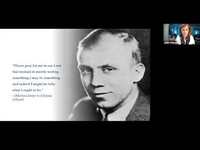 Judith Valente - Why We Still Read and Need Thomas Merton: A Personal Journey. Presented for the Tuesdays with Merton Series, August 10, 2021.
Judith Valente - Why We Still Read and Need Thomas Merton: A Personal Journey. Presented for the Tuesdays with Merton Series, August 10, 2021. In a 1966 Commonweal article, Merton describes a time when “almost nothing is really predictable … almost everything public is patently phony, and in which there is at the same time an immense ground of personal authenticity that is right there and so obvious that … most cannot even believe that it is there." Is there a more apt description of the situation we face today? How then can we fashion a personal response to the "new normal" that is unfolding? With Merton as our navigator, is there a way to discover clarity, meaning, authenticity, and, yes, even beauty in these confounding times?
Judith Valente first began reading Thomas Merton shortly before beginning her career in journalism at the age of 21 at The Washington Post. She subsequently worked for The Wall Street Journal and was twice a finalist for the Pulitzer Prize in journalism. She then covered religion as an on-air correspondent for PBS. She is the author of two collections of poetry and several spirituality titles, including How to Live: What The Rule of St. Benedict Teaches Us About Happiness, Meaning and Community and The Art of Pausing, which she coauthored with Brother Paul Quenon.
-
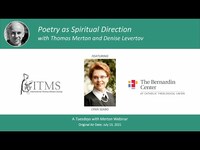 Lynn R. Szabo - Poetry as Spiritual Direction with Thomas Merton and Denise Levertov. Presented for the Tuesdays with Merton Series, July 13, 2021.
Lynn R. Szabo - Poetry as Spiritual Direction with Thomas Merton and Denise Levertov. Presented for the Tuesdays with Merton Series, July 13, 2021. As participating readers of his powerful gift for spiritual direction, even in absentia and posthumously present, already know from their experience of his writings, the most significant forces in Thomas Merton’s own spiritual formation came from his reading and pursuing of intersections and convergences with those whose influence shaped his ever-organic selfhood and its transcendence. In many ways profound and providential resonances, his “double image,” Denise Levertov, like Merton, creates poetry which serves as spiritual direction. Their friendship creates a pas de deux for those inclined to join in “the general dance” of the Spirit in the cosmos.
Lynn R. Szabo is a devoted scholar of the poet, mystic, and political activist Thomas Merton. She is the editor of the first comprehensive selection of his poetry, In the Dark Before Dawn: New Selected Poems of Thomas Merton (New Directions, 2005), and is Professor Emerita of English Literature, Trinity Western University, near Vancouver. In her retirement, Lynn serves as a spiritual director, a mentor to writers and young professors, and a facilitator of study groups for the National Council of Jewish Women. Her decades of studying poetry, especially Merton’s, are one of the pleasures not interrupted by her more recent life as a wheelchair navigator!
-
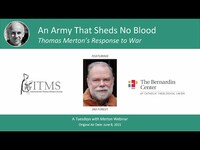 Jim Forest - An Army that Sheds No Blood: Thomas Merton’s Response to War. Presented for the Tuesdays with Merton Series, June 8, 2021.
Jim Forest - An Army that Sheds No Blood: Thomas Merton’s Response to War. Presented for the Tuesdays with Merton Series, June 8, 2021. Clement of Alexandria, in his Protreptikos (Greek for “persuasion”), defined the Church as “an army that sheds no blood.” This phrase struck Thomas Merton with special force. It greatly distressed him that so many of his Christian contemporaries were advocates of war and even saw nuclear weapons as enjoying God’s blessing. This session will discuss Merton’s engagement in peacemaking and his close ties with Dorothy Day and others who were at war with war.
Jim Forest has spent a lifetime in the cause of peace and reconciliation. Among his personal acquaintances were some of the great peacemakers of our time, including Thomas Merton, Daniel Berrigan, Henri Nouwen, and Thich Nhat Hanh. He worked with Dorothy Day at the Catholic Worker in New York and then went on to play a key role in mobilizing religious protest against the Vietnam War and served a year in prison for his role in destroying draft records in Milwaukee. He is the author of over a dozen books on spirituality and peacemaking, including The Root of War is Fear: Thomas Merton's Advice to Peacemakers.
-
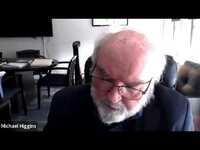 Michael W. Higgins - Merton and David Jones: Visionaries Both. Presented for the Tuesdays with Merton Series, May 11 , 2021.
Michael W. Higgins - Merton and David Jones: Visionaries Both. Presented for the Tuesdays with Merton Series, May 11 , 2021. Merton Was in Love With Wales — its poetry, its Celtic sensibility, its ravishing beauty and rich history. Although he came to the art of David Jones rather late in his life, he understood implicitly what Jones was doing as a visionary. There are some striking things that they were doing in parallel unaware of each other, probing the past, resurrecting forgotten cultural memories, attending to the power of ritual and sacrament, aching for unity and harmony. This session will explore some of these creative and spiritual convergences.
Dr. Michael W. Higgins is a university president, biographer, journalist, scholar, and media commentator. His book on Cardinal Newman will appear in the Spring of 2021 and his book on Pope Francis in 2023. Past publications on Merton include: Heretic Blood: The Spiritual Geography of Thomas Merton; Faithful Visionary; The Unquiet Monk; and Thomas Merton: Pilgrim in Process (ed).
-
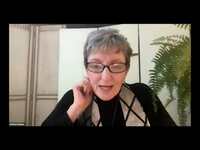 Kathleen N. Deignan, CND - Overshadowed: Thomas Merton and The Cloud of Unknowing. Presented for the Tuesdays with Merton Series, April 13, 2021.
Kathleen N. Deignan, CND - Overshadowed: Thomas Merton and The Cloud of Unknowing. Presented for the Tuesdays with Merton Series, April 13, 2021. Every wisdom tradition describes in its own way a cloud of unknowing that veils the utterly ineffable source and force coursing through this universe as its very life. With paradoxical lucidity on matters of darkness and unknowing, Thomas Merton shared his experience of being "overshadowed" by the Cloud of enveloping Mystery. His desire to live into its Presence has become a well-scripted legacy of post-modern spiritual emergence, written in an idiom that continues to speak cogently to the spiritual pilgrims of the second millennium. This session explores Merton's "familiarity" with the anonymous 14th century master of The Cloud, and his own transmission of its still emerging wisdom.
Dr. Kathleen Noone Deignan of the Congregation of Notre Dame is founding director of the Deignan Institute for Earth and Spirit at Iona College, New Rochelle, NY, where she was Professor of Religious Studies for 40 years while guiding The Merton Contemplative Initiative and co-convening The Thomas Berry Forum for Ecological Dialogue. Past President of the International Thomas Merton Society, she is a regular presenter at its meetings. Her book-length publications include When the Trees Say Nothing: Thomas Merton’s Writings on Nature and Thomas Merton: A Book of Hours, including an audio-book that includes her sacred songs and psalmody.
-
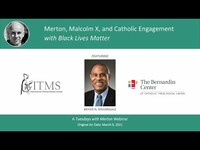 Bryan Massingale - Merton, Malcolm X, and Catholic Engagement with Black Lives Matter. Presented for the Tuesdays with Merton Series, March 9, 2021.
Bryan Massingale - Merton, Malcolm X, and Catholic Engagement with Black Lives Matter. Presented for the Tuesdays with Merton Series, March 9, 2021. Catholic Engagement with the Black Lives Matter movement has been hesitant, at best. At worst, Catholic leaders deride it with virulent opposition and denigration. As the Movement for Black Lives claims Malcolm X as one of their inspirations, this presentation will examine Merton's engagement with Malcolm X and radical Black thought to suggest how Catholics should engage the contemporary movement for racial justice.
Bryan N. Massingale holds the James and Nancy Buckman Chair in Applied Christian Ethics at Fordham University. A priest of the Archdiocese of Milwaukee, he is a leader in Catholic theology and ethics as the current President-Elect of the Society of Christian Ethics, a past Convener of the Black Catholic Theological Symposium, and a former president of the Catholic Theological Society of America. He is the author of the award-winning book Racial Justice and the Catholic Church and a public intellectual who frequently addresses issues of racial and sexual justice.
-
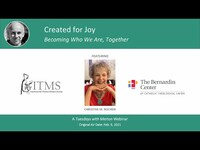 Christine M. Bochen - Created for Joy: Becoming Who We Are, Together. Presented for the Tuesdays with Merton Series, February 9, 2021.
Christine M. Bochen - Created for Joy: Becoming Who We Are, Together. Presented for the Tuesdays with Merton Series, February 9, 2021. During these turbulent, uncertain times of pandemics – corona virus, racism, unbridled individualism – and, thankfully, of moral reckoning, Thomas Merton offers a welcome and much needed message of hope. He reminds us that we are “created for JOY.” In this presentation, we will consider how Merton experienced and envisioned joy, particularly the joy of being human and the joy of friendship. For Merton, joy is both promise and vocation. How, then inspired by Merton, might we learn to delight in the “immense joy” of being human and “together . . . travel our own road to joy”?
Christine M. Bochen, professor emerita of religious studies at Nazareth College, Rochester, New York and a founding member and past president of the International Thomas Merton Society, has taught courses, given retreats, and spoken on Merton in a variety of venues in the United States, Canada, and abroad. Christine is co-author, with William H. Shannon and Patrick F. O’Connell, of The Thomas Merton Encyclopedia; editor of Courage for Truth, Learning to Love, and Thomas Merton: Essential Writings; and co-editor, with William H. Shannon, of Cold War Letters and Thomas Merton: A Life in Letters.
-
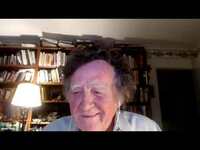 Jim Finley - Turning to Thomas Merton as a Trustworthy Guide in the Gentle Art of Contemplative Living. Presented for the Tuesdays with Merton Series, January 12, 2021.
Jim Finley - Turning to Thomas Merton as a Trustworthy Guide in the Gentle Art of Contemplative Living. Presented for the Tuesdays with Merton Series, January 12, 2021. In our time together I will share aspects of Merton’s life and teachings that had a profound and lasting effect in my own life and in my attempts to pass on to others what Thomas Merton has passed on to me. These foundational aspects of Merton’s life and teachings include our own unfolding life with all its blessings and broken edges embodying the presence of God that protects us from nothing even as it unexplainably sustains us in all things, as well as Merton’s vision of the hidden wholeness where everything connects as realized in the contemplative depths of the world’s great religions and in all of life.
Dr. James Finley received spiritual guidance from Thomas Merton as a novice at the Abbey of Gethsemani. He is a contemplative teacher and writer and a retired clinical psychologist. He leads the weekly podcast “Turning to the Mystics” in his role as core teacher in the Living School for Action and Contemplation founded by Father Richard Rohr. James is the author of Merton’s Palace of Nowhere, The Contemplative Heart, and Christian Meditation: Experiencing the Presence of God.
-
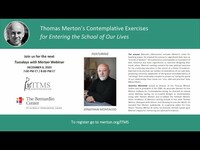 Jonathan Montaldo - Thomas Merton’s Contemplative Exercises for Entering the School of Our Lives. Presented for the Tuesdays with Merton Series, December 8, 2020.
Jonathan Montaldo - Thomas Merton’s Contemplative Exercises for Entering the School of Our Lives. Presented for the Tuesdays with Merton Series, December 8, 2020. The volume Monastic Observances includes Merton's notes for teaching prayer. He inspired his novices to apprehend their lives as "schools of wisdom". He mentored a contemplative re-translation of their historical and inner experiences as exercises designing their truest selves. Merton's writing contains his own spiritual exercises for his continuing education in the school of a Divine Providence. Exercises in his journals can mentor re-translations of our own lives, producing conscious epiphanies of the graced interdependence of "all things" that continually conspire to propel our loving the world of our relationships that create our "one, wild and precious" lives (Mary Oliver).
Jonathan Montaldo served as director of the Thomas Merton Center and as president of the ITMS. As associate director for the Merton Institute for Contemplative Living, he directed its retreat center Bethany Spring. He co-created Bridges to Contemplative Living with Thomas Merton and co-edited The Intimate Merton. Other renditions of Merton’s writing include A Year with Thomas Merton, Dialogues with Silence, and Choosing to Love the World. He narrated five Merton audiobooks. A co-general editor for Fons Vitae’s Thomas Merton & series, he presents retreats based upon Merton’s legacy for mentoring our spiritual formations.
 Sophfronia Scott - The Radio of Nature: Merton's Tuning Into God Outdoors. Presented for the Tuesdays with Merton Series, September 14, 2021. On June 27, 1949, Merton was allowed, for the first time, to venture outside the Abbey of Gethsemani’s gated enclosure to walk in the woods alone. His writing and his spirituality changed forever as a result. In Thomas Merton's Gethsemani: Landscapes of Paradise, author Monica Weis notes, "Once beyond the monastery walls, Merton's heart soared." Why? Perhaps, after being doused in words for years, suddenly he could share an expansive, silent space with God and just listen. This session will explore what Merton found beneath the branches, on the hills, and in all of nature: a sense of transcendence. Sophfronia Scott is a novelist, essayist, and leading contemplative thinker whose work has appeared in numerous publications. Her latest book, The Seeker and the Monk: Everyday Conversations with Thomas Merton, received a Louie award in 2021. Sophfronia’s other books include Love's Long Line, and This Child of Faith: Raising a Spiritual Child in a Secular World, co-written with her son Tain. She holds degrees from Harvard and Vermont College of Fine Arts. Sophfronia lives in Sandy Hook, Connecticut and is the founding director of Alma College’s MFA in Creative Writing, a graduate program based in Alma, Michigan.
Sophfronia Scott - The Radio of Nature: Merton's Tuning Into God Outdoors. Presented for the Tuesdays with Merton Series, September 14, 2021. On June 27, 1949, Merton was allowed, for the first time, to venture outside the Abbey of Gethsemani’s gated enclosure to walk in the woods alone. His writing and his spirituality changed forever as a result. In Thomas Merton's Gethsemani: Landscapes of Paradise, author Monica Weis notes, "Once beyond the monastery walls, Merton's heart soared." Why? Perhaps, after being doused in words for years, suddenly he could share an expansive, silent space with God and just listen. This session will explore what Merton found beneath the branches, on the hills, and in all of nature: a sense of transcendence. Sophfronia Scott is a novelist, essayist, and leading contemplative thinker whose work has appeared in numerous publications. Her latest book, The Seeker and the Monk: Everyday Conversations with Thomas Merton, received a Louie award in 2021. Sophfronia’s other books include Love's Long Line, and This Child of Faith: Raising a Spiritual Child in a Secular World, co-written with her son Tain. She holds degrees from Harvard and Vermont College of Fine Arts. Sophfronia lives in Sandy Hook, Connecticut and is the founding director of Alma College’s MFA in Creative Writing, a graduate program based in Alma, Michigan. Judith Valente - Why We Still Read and Need Thomas Merton: A Personal Journey. Presented for the Tuesdays with Merton Series, August 10, 2021. In a 1966 Commonweal article, Merton describes a time when “almost nothing is really predictable … almost everything public is patently phony, and in which there is at the same time an immense ground of personal authenticity that is right there and so obvious that … most cannot even believe that it is there." Is there a more apt description of the situation we face today? How then can we fashion a personal response to the "new normal" that is unfolding? With Merton as our navigator, is there a way to discover clarity, meaning, authenticity, and, yes, even beauty in these confounding times? Judith Valente first began reading Thomas Merton shortly before beginning her career in journalism at the age of 21 at The Washington Post. She subsequently worked for The Wall Street Journal and was twice a finalist for the Pulitzer Prize in journalism. She then covered religion as an on-air correspondent for PBS. She is the author of two collections of poetry and several spirituality titles, including How to Live: What The Rule of St. Benedict Teaches Us About Happiness, Meaning and Community and The Art of Pausing, which she coauthored with Brother Paul Quenon.
Judith Valente - Why We Still Read and Need Thomas Merton: A Personal Journey. Presented for the Tuesdays with Merton Series, August 10, 2021. In a 1966 Commonweal article, Merton describes a time when “almost nothing is really predictable … almost everything public is patently phony, and in which there is at the same time an immense ground of personal authenticity that is right there and so obvious that … most cannot even believe that it is there." Is there a more apt description of the situation we face today? How then can we fashion a personal response to the "new normal" that is unfolding? With Merton as our navigator, is there a way to discover clarity, meaning, authenticity, and, yes, even beauty in these confounding times? Judith Valente first began reading Thomas Merton shortly before beginning her career in journalism at the age of 21 at The Washington Post. She subsequently worked for The Wall Street Journal and was twice a finalist for the Pulitzer Prize in journalism. She then covered religion as an on-air correspondent for PBS. She is the author of two collections of poetry and several spirituality titles, including How to Live: What The Rule of St. Benedict Teaches Us About Happiness, Meaning and Community and The Art of Pausing, which she coauthored with Brother Paul Quenon. Lynn R. Szabo - Poetry as Spiritual Direction with Thomas Merton and Denise Levertov. Presented for the Tuesdays with Merton Series, July 13, 2021. As participating readers of his powerful gift for spiritual direction, even in absentia and posthumously present, already know from their experience of his writings, the most significant forces in Thomas Merton’s own spiritual formation came from his reading and pursuing of intersections and convergences with those whose influence shaped his ever-organic selfhood and its transcendence. In many ways profound and providential resonances, his “double image,” Denise Levertov, like Merton, creates poetry which serves as spiritual direction. Their friendship creates a pas de deux for those inclined to join in “the general dance” of the Spirit in the cosmos. Lynn R. Szabo is a devoted scholar of the poet, mystic, and political activist Thomas Merton. She is the editor of the first comprehensive selection of his poetry, In the Dark Before Dawn: New Selected Poems of Thomas Merton (New Directions, 2005), and is Professor Emerita of English Literature, Trinity Western University, near Vancouver. In her retirement, Lynn serves as a spiritual director, a mentor to writers and young professors, and a facilitator of study groups for the National Council of Jewish Women. Her decades of studying poetry, especially Merton’s, are one of the pleasures not interrupted by her more recent life as a wheelchair navigator!
Lynn R. Szabo - Poetry as Spiritual Direction with Thomas Merton and Denise Levertov. Presented for the Tuesdays with Merton Series, July 13, 2021. As participating readers of his powerful gift for spiritual direction, even in absentia and posthumously present, already know from their experience of his writings, the most significant forces in Thomas Merton’s own spiritual formation came from his reading and pursuing of intersections and convergences with those whose influence shaped his ever-organic selfhood and its transcendence. In many ways profound and providential resonances, his “double image,” Denise Levertov, like Merton, creates poetry which serves as spiritual direction. Their friendship creates a pas de deux for those inclined to join in “the general dance” of the Spirit in the cosmos. Lynn R. Szabo is a devoted scholar of the poet, mystic, and political activist Thomas Merton. She is the editor of the first comprehensive selection of his poetry, In the Dark Before Dawn: New Selected Poems of Thomas Merton (New Directions, 2005), and is Professor Emerita of English Literature, Trinity Western University, near Vancouver. In her retirement, Lynn serves as a spiritual director, a mentor to writers and young professors, and a facilitator of study groups for the National Council of Jewish Women. Her decades of studying poetry, especially Merton’s, are one of the pleasures not interrupted by her more recent life as a wheelchair navigator! Jim Forest - An Army that Sheds No Blood: Thomas Merton’s Response to War. Presented for the Tuesdays with Merton Series, June 8, 2021. Clement of Alexandria, in his Protreptikos (Greek for “persuasion”), defined the Church as “an army that sheds no blood.” This phrase struck Thomas Merton with special force. It greatly distressed him that so many of his Christian contemporaries were advocates of war and even saw nuclear weapons as enjoying God’s blessing. This session will discuss Merton’s engagement in peacemaking and his close ties with Dorothy Day and others who were at war with war. Jim Forest has spent a lifetime in the cause of peace and reconciliation. Among his personal acquaintances were some of the great peacemakers of our time, including Thomas Merton, Daniel Berrigan, Henri Nouwen, and Thich Nhat Hanh. He worked with Dorothy Day at the Catholic Worker in New York and then went on to play a key role in mobilizing religious protest against the Vietnam War and served a year in prison for his role in destroying draft records in Milwaukee. He is the author of over a dozen books on spirituality and peacemaking, including The Root of War is Fear: Thomas Merton's Advice to Peacemakers.
Jim Forest - An Army that Sheds No Blood: Thomas Merton’s Response to War. Presented for the Tuesdays with Merton Series, June 8, 2021. Clement of Alexandria, in his Protreptikos (Greek for “persuasion”), defined the Church as “an army that sheds no blood.” This phrase struck Thomas Merton with special force. It greatly distressed him that so many of his Christian contemporaries were advocates of war and even saw nuclear weapons as enjoying God’s blessing. This session will discuss Merton’s engagement in peacemaking and his close ties with Dorothy Day and others who were at war with war. Jim Forest has spent a lifetime in the cause of peace and reconciliation. Among his personal acquaintances were some of the great peacemakers of our time, including Thomas Merton, Daniel Berrigan, Henri Nouwen, and Thich Nhat Hanh. He worked with Dorothy Day at the Catholic Worker in New York and then went on to play a key role in mobilizing religious protest against the Vietnam War and served a year in prison for his role in destroying draft records in Milwaukee. He is the author of over a dozen books on spirituality and peacemaking, including The Root of War is Fear: Thomas Merton's Advice to Peacemakers. Michael W. Higgins - Merton and David Jones: Visionaries Both. Presented for the Tuesdays with Merton Series, May 11 , 2021. Merton Was in Love With Wales — its poetry, its Celtic sensibility, its ravishing beauty and rich history. Although he came to the art of David Jones rather late in his life, he understood implicitly what Jones was doing as a visionary. There are some striking things that they were doing in parallel unaware of each other, probing the past, resurrecting forgotten cultural memories, attending to the power of ritual and sacrament, aching for unity and harmony. This session will explore some of these creative and spiritual convergences. Dr. Michael W. Higgins is a university president, biographer, journalist, scholar, and media commentator. His book on Cardinal Newman will appear in the Spring of 2021 and his book on Pope Francis in 2023. Past publications on Merton include: Heretic Blood: The Spiritual Geography of Thomas Merton; Faithful Visionary; The Unquiet Monk; and Thomas Merton: Pilgrim in Process (ed).
Michael W. Higgins - Merton and David Jones: Visionaries Both. Presented for the Tuesdays with Merton Series, May 11 , 2021. Merton Was in Love With Wales — its poetry, its Celtic sensibility, its ravishing beauty and rich history. Although he came to the art of David Jones rather late in his life, he understood implicitly what Jones was doing as a visionary. There are some striking things that they were doing in parallel unaware of each other, probing the past, resurrecting forgotten cultural memories, attending to the power of ritual and sacrament, aching for unity and harmony. This session will explore some of these creative and spiritual convergences. Dr. Michael W. Higgins is a university president, biographer, journalist, scholar, and media commentator. His book on Cardinal Newman will appear in the Spring of 2021 and his book on Pope Francis in 2023. Past publications on Merton include: Heretic Blood: The Spiritual Geography of Thomas Merton; Faithful Visionary; The Unquiet Monk; and Thomas Merton: Pilgrim in Process (ed). Kathleen N. Deignan, CND - Overshadowed: Thomas Merton and The Cloud of Unknowing. Presented for the Tuesdays with Merton Series, April 13, 2021. Every wisdom tradition describes in its own way a cloud of unknowing that veils the utterly ineffable source and force coursing through this universe as its very life. With paradoxical lucidity on matters of darkness and unknowing, Thomas Merton shared his experience of being "overshadowed" by the Cloud of enveloping Mystery. His desire to live into its Presence has become a well-scripted legacy of post-modern spiritual emergence, written in an idiom that continues to speak cogently to the spiritual pilgrims of the second millennium. This session explores Merton's "familiarity" with the anonymous 14th century master of The Cloud, and his own transmission of its still emerging wisdom. Dr. Kathleen Noone Deignan of the Congregation of Notre Dame is founding director of the Deignan Institute for Earth and Spirit at Iona College, New Rochelle, NY, where she was Professor of Religious Studies for 40 years while guiding The Merton Contemplative Initiative and co-convening The Thomas Berry Forum for Ecological Dialogue. Past President of the International Thomas Merton Society, she is a regular presenter at its meetings. Her book-length publications include When the Trees Say Nothing: Thomas Merton’s Writings on Nature and Thomas Merton: A Book of Hours, including an audio-book that includes her sacred songs and psalmody.
Kathleen N. Deignan, CND - Overshadowed: Thomas Merton and The Cloud of Unknowing. Presented for the Tuesdays with Merton Series, April 13, 2021. Every wisdom tradition describes in its own way a cloud of unknowing that veils the utterly ineffable source and force coursing through this universe as its very life. With paradoxical lucidity on matters of darkness and unknowing, Thomas Merton shared his experience of being "overshadowed" by the Cloud of enveloping Mystery. His desire to live into its Presence has become a well-scripted legacy of post-modern spiritual emergence, written in an idiom that continues to speak cogently to the spiritual pilgrims of the second millennium. This session explores Merton's "familiarity" with the anonymous 14th century master of The Cloud, and his own transmission of its still emerging wisdom. Dr. Kathleen Noone Deignan of the Congregation of Notre Dame is founding director of the Deignan Institute for Earth and Spirit at Iona College, New Rochelle, NY, where she was Professor of Religious Studies for 40 years while guiding The Merton Contemplative Initiative and co-convening The Thomas Berry Forum for Ecological Dialogue. Past President of the International Thomas Merton Society, she is a regular presenter at its meetings. Her book-length publications include When the Trees Say Nothing: Thomas Merton’s Writings on Nature and Thomas Merton: A Book of Hours, including an audio-book that includes her sacred songs and psalmody. Bryan Massingale - Merton, Malcolm X, and Catholic Engagement with Black Lives Matter. Presented for the Tuesdays with Merton Series, March 9, 2021. Catholic Engagement with the Black Lives Matter movement has been hesitant, at best. At worst, Catholic leaders deride it with virulent opposition and denigration. As the Movement for Black Lives claims Malcolm X as one of their inspirations, this presentation will examine Merton's engagement with Malcolm X and radical Black thought to suggest how Catholics should engage the contemporary movement for racial justice. Bryan N. Massingale holds the James and Nancy Buckman Chair in Applied Christian Ethics at Fordham University. A priest of the Archdiocese of Milwaukee, he is a leader in Catholic theology and ethics as the current President-Elect of the Society of Christian Ethics, a past Convener of the Black Catholic Theological Symposium, and a former president of the Catholic Theological Society of America. He is the author of the award-winning book Racial Justice and the Catholic Church and a public intellectual who frequently addresses issues of racial and sexual justice.
Bryan Massingale - Merton, Malcolm X, and Catholic Engagement with Black Lives Matter. Presented for the Tuesdays with Merton Series, March 9, 2021. Catholic Engagement with the Black Lives Matter movement has been hesitant, at best. At worst, Catholic leaders deride it with virulent opposition and denigration. As the Movement for Black Lives claims Malcolm X as one of their inspirations, this presentation will examine Merton's engagement with Malcolm X and radical Black thought to suggest how Catholics should engage the contemporary movement for racial justice. Bryan N. Massingale holds the James and Nancy Buckman Chair in Applied Christian Ethics at Fordham University. A priest of the Archdiocese of Milwaukee, he is a leader in Catholic theology and ethics as the current President-Elect of the Society of Christian Ethics, a past Convener of the Black Catholic Theological Symposium, and a former president of the Catholic Theological Society of America. He is the author of the award-winning book Racial Justice and the Catholic Church and a public intellectual who frequently addresses issues of racial and sexual justice. Christine M. Bochen - Created for Joy: Becoming Who We Are, Together. Presented for the Tuesdays with Merton Series, February 9, 2021. During these turbulent, uncertain times of pandemics – corona virus, racism, unbridled individualism – and, thankfully, of moral reckoning, Thomas Merton offers a welcome and much needed message of hope. He reminds us that we are “created for JOY.” In this presentation, we will consider how Merton experienced and envisioned joy, particularly the joy of being human and the joy of friendship. For Merton, joy is both promise and vocation. How, then inspired by Merton, might we learn to delight in the “immense joy” of being human and “together . . . travel our own road to joy”? Christine M. Bochen, professor emerita of religious studies at Nazareth College, Rochester, New York and a founding member and past president of the International Thomas Merton Society, has taught courses, given retreats, and spoken on Merton in a variety of venues in the United States, Canada, and abroad. Christine is co-author, with William H. Shannon and Patrick F. O’Connell, of The Thomas Merton Encyclopedia; editor of Courage for Truth, Learning to Love, and Thomas Merton: Essential Writings; and co-editor, with William H. Shannon, of Cold War Letters and Thomas Merton: A Life in Letters.
Christine M. Bochen - Created for Joy: Becoming Who We Are, Together. Presented for the Tuesdays with Merton Series, February 9, 2021. During these turbulent, uncertain times of pandemics – corona virus, racism, unbridled individualism – and, thankfully, of moral reckoning, Thomas Merton offers a welcome and much needed message of hope. He reminds us that we are “created for JOY.” In this presentation, we will consider how Merton experienced and envisioned joy, particularly the joy of being human and the joy of friendship. For Merton, joy is both promise and vocation. How, then inspired by Merton, might we learn to delight in the “immense joy” of being human and “together . . . travel our own road to joy”? Christine M. Bochen, professor emerita of religious studies at Nazareth College, Rochester, New York and a founding member and past president of the International Thomas Merton Society, has taught courses, given retreats, and spoken on Merton in a variety of venues in the United States, Canada, and abroad. Christine is co-author, with William H. Shannon and Patrick F. O’Connell, of The Thomas Merton Encyclopedia; editor of Courage for Truth, Learning to Love, and Thomas Merton: Essential Writings; and co-editor, with William H. Shannon, of Cold War Letters and Thomas Merton: A Life in Letters. Jim Finley - Turning to Thomas Merton as a Trustworthy Guide in the Gentle Art of Contemplative Living. Presented for the Tuesdays with Merton Series, January 12, 2021. In our time together I will share aspects of Merton’s life and teachings that had a profound and lasting effect in my own life and in my attempts to pass on to others what Thomas Merton has passed on to me. These foundational aspects of Merton’s life and teachings include our own unfolding life with all its blessings and broken edges embodying the presence of God that protects us from nothing even as it unexplainably sustains us in all things, as well as Merton’s vision of the hidden wholeness where everything connects as realized in the contemplative depths of the world’s great religions and in all of life. Dr. James Finley received spiritual guidance from Thomas Merton as a novice at the Abbey of Gethsemani. He is a contemplative teacher and writer and a retired clinical psychologist. He leads the weekly podcast “Turning to the Mystics” in his role as core teacher in the Living School for Action and Contemplation founded by Father Richard Rohr. James is the author of Merton’s Palace of Nowhere, The Contemplative Heart, and Christian Meditation: Experiencing the Presence of God.
Jim Finley - Turning to Thomas Merton as a Trustworthy Guide in the Gentle Art of Contemplative Living. Presented for the Tuesdays with Merton Series, January 12, 2021. In our time together I will share aspects of Merton’s life and teachings that had a profound and lasting effect in my own life and in my attempts to pass on to others what Thomas Merton has passed on to me. These foundational aspects of Merton’s life and teachings include our own unfolding life with all its blessings and broken edges embodying the presence of God that protects us from nothing even as it unexplainably sustains us in all things, as well as Merton’s vision of the hidden wholeness where everything connects as realized in the contemplative depths of the world’s great religions and in all of life. Dr. James Finley received spiritual guidance from Thomas Merton as a novice at the Abbey of Gethsemani. He is a contemplative teacher and writer and a retired clinical psychologist. He leads the weekly podcast “Turning to the Mystics” in his role as core teacher in the Living School for Action and Contemplation founded by Father Richard Rohr. James is the author of Merton’s Palace of Nowhere, The Contemplative Heart, and Christian Meditation: Experiencing the Presence of God. Jonathan Montaldo - Thomas Merton’s Contemplative Exercises for Entering the School of Our Lives. Presented for the Tuesdays with Merton Series, December 8, 2020. The volume Monastic Observances includes Merton's notes for teaching prayer. He inspired his novices to apprehend their lives as "schools of wisdom". He mentored a contemplative re-translation of their historical and inner experiences as exercises designing their truest selves. Merton's writing contains his own spiritual exercises for his continuing education in the school of a Divine Providence. Exercises in his journals can mentor re-translations of our own lives, producing conscious epiphanies of the graced interdependence of "all things" that continually conspire to propel our loving the world of our relationships that create our "one, wild and precious" lives (Mary Oliver). Jonathan Montaldo served as director of the Thomas Merton Center and as president of the ITMS. As associate director for the Merton Institute for Contemplative Living, he directed its retreat center Bethany Spring. He co-created Bridges to Contemplative Living with Thomas Merton and co-edited The Intimate Merton. Other renditions of Merton’s writing include A Year with Thomas Merton, Dialogues with Silence, and Choosing to Love the World. He narrated five Merton audiobooks. A co-general editor for Fons Vitae’s Thomas Merton & series, he presents retreats based upon Merton’s legacy for mentoring our spiritual formations.
Jonathan Montaldo - Thomas Merton’s Contemplative Exercises for Entering the School of Our Lives. Presented for the Tuesdays with Merton Series, December 8, 2020. The volume Monastic Observances includes Merton's notes for teaching prayer. He inspired his novices to apprehend their lives as "schools of wisdom". He mentored a contemplative re-translation of their historical and inner experiences as exercises designing their truest selves. Merton's writing contains his own spiritual exercises for his continuing education in the school of a Divine Providence. Exercises in his journals can mentor re-translations of our own lives, producing conscious epiphanies of the graced interdependence of "all things" that continually conspire to propel our loving the world of our relationships that create our "one, wild and precious" lives (Mary Oliver). Jonathan Montaldo served as director of the Thomas Merton Center and as president of the ITMS. As associate director for the Merton Institute for Contemplative Living, he directed its retreat center Bethany Spring. He co-created Bridges to Contemplative Living with Thomas Merton and co-edited The Intimate Merton. Other renditions of Merton’s writing include A Year with Thomas Merton, Dialogues with Silence, and Choosing to Love the World. He narrated five Merton audiobooks. A co-general editor for Fons Vitae’s Thomas Merton & series, he presents retreats based upon Merton’s legacy for mentoring our spiritual formations.